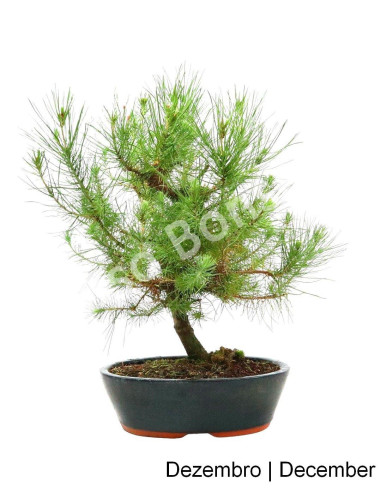- -10%
12-year old Halepensis Bonsai pine
Species belonging to the family of Pináceaes originating in the Mediterranica Basin.
Also known as Pinheiro de Alepo, it is very common in the Portuguese forests, it has a small needle size and a gray shell with few roughnesses.
It is a very resistant variety, which rebounds well after pruning, since on the cut leg remain needles.
Pinheiro Halepensis Bonsai is an outdoor plant.
Common Name: Aleppo pine
Scientific name: Pinus Halepensis
Characterization: Member of the family of Pináceaes, originates from the Mediterranean.
Bonsai perennial with light green needles of reduced dimensions, is common in the South of Portugal where given its rusticity manages to survive in conditions of drought and poor and stony soils.
It has a clear gray shell without roughness, which contrasts with the green of the needles, being an extremely resilient Mediterranean climate plant is a good Pinus for beginners.
Location: No Outdoor in the full sun, where take 3 to 4 hours of direct sun per day (ideal in the morning or at the end of the day), protected from strong winds and frosts.
Water: To water abundantly the earth until a lot of water goes out through the drain holes in order to moisten evenly the soil, always above never by immersion, with a fine drain waterer.
Tips on watering, see technical data collection.
Let dry very well the surface layer of the soil between each watering (to confirm if the plant already needs water, touch the earth with fingers).
If you have a dish under Bonsai, never leave any water in it (to prevent the roots from rotting).
There is no advantage in spraying the leaves, just do it in days that it adds and if the fertilizer is specific for foliar application, but ensure that they arrive dry at night to avoid fungi.
Nutrition: From February to October, with a base plan composed of a complete fertilizer (Green & Gold Bonsai Organic or Biogold), and a biostimulant (Bio Bonsai Activ), can still be linked with other products in our range.
Detailed information on how to combine these products the rest of our range, or for a more specific nutrition plan, see complete nutrition plan technical sheet.
Poda: It can be pruned throughout the growing season as it easily back buding from old needles.
Taking into account the vigorous growth, the interior of the canopy usually gets yellow needles, these should be removed manually to enter light and stimulate sprouting inside.
Tips on pruning, see the technical sheet pruning and defoliation.
Transplant: With Terra Bonsai Coníferas in February/March, when the candles begin to "move".
Details about transplants, post transplants and specific fortifiers that you can use refer to repotting technical sheet.
Scratch: From the end of autumn to the beginning of spring, we should avoid aramar in summer.
Indications on padding, see wiring technical sheet.
- Habitat
- Outdoor
- Sheet Type
- Persistent
- Species
- Pinus Halepensis
- Origin
- Luso-Bonsai (PT)




































